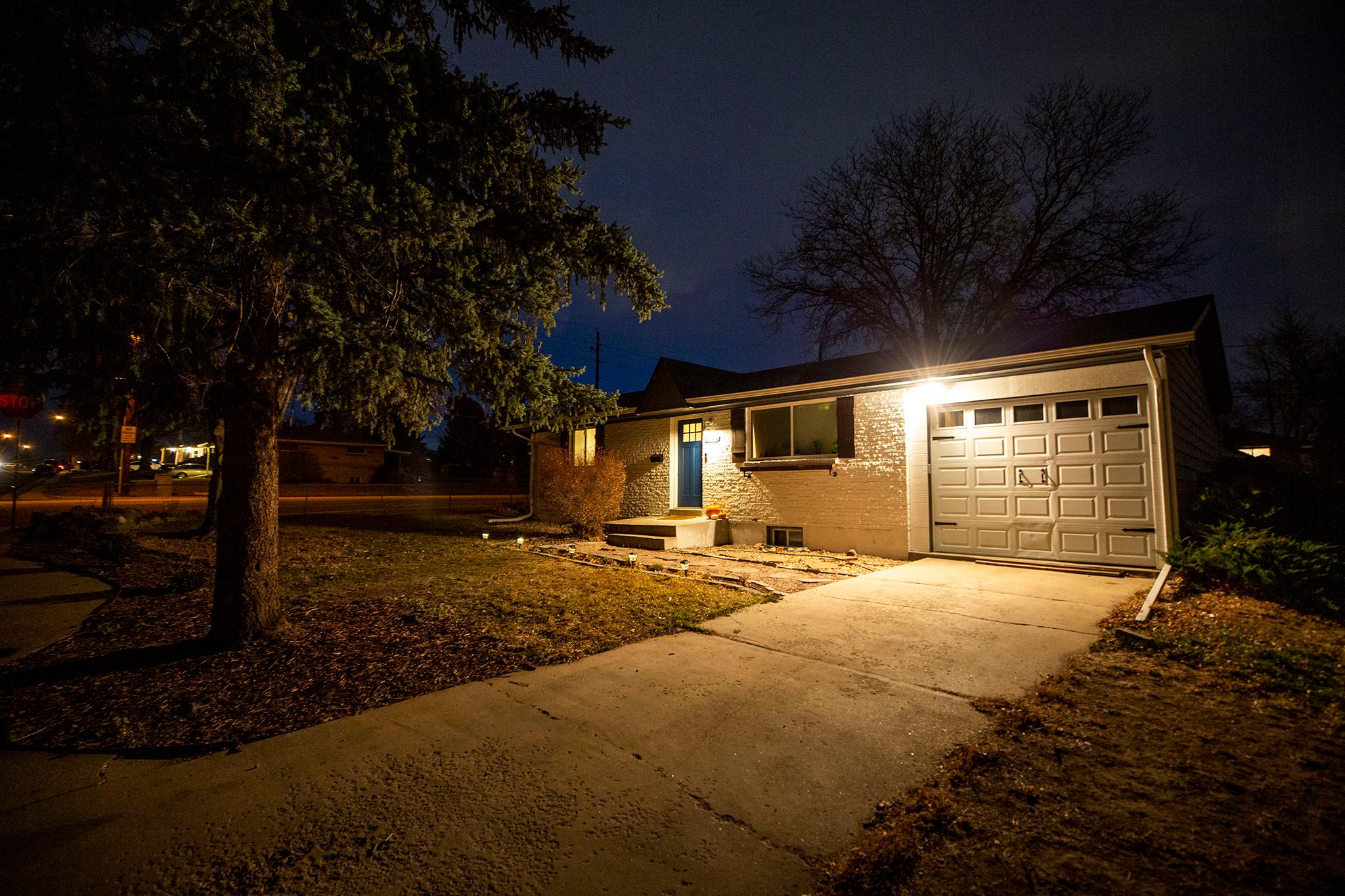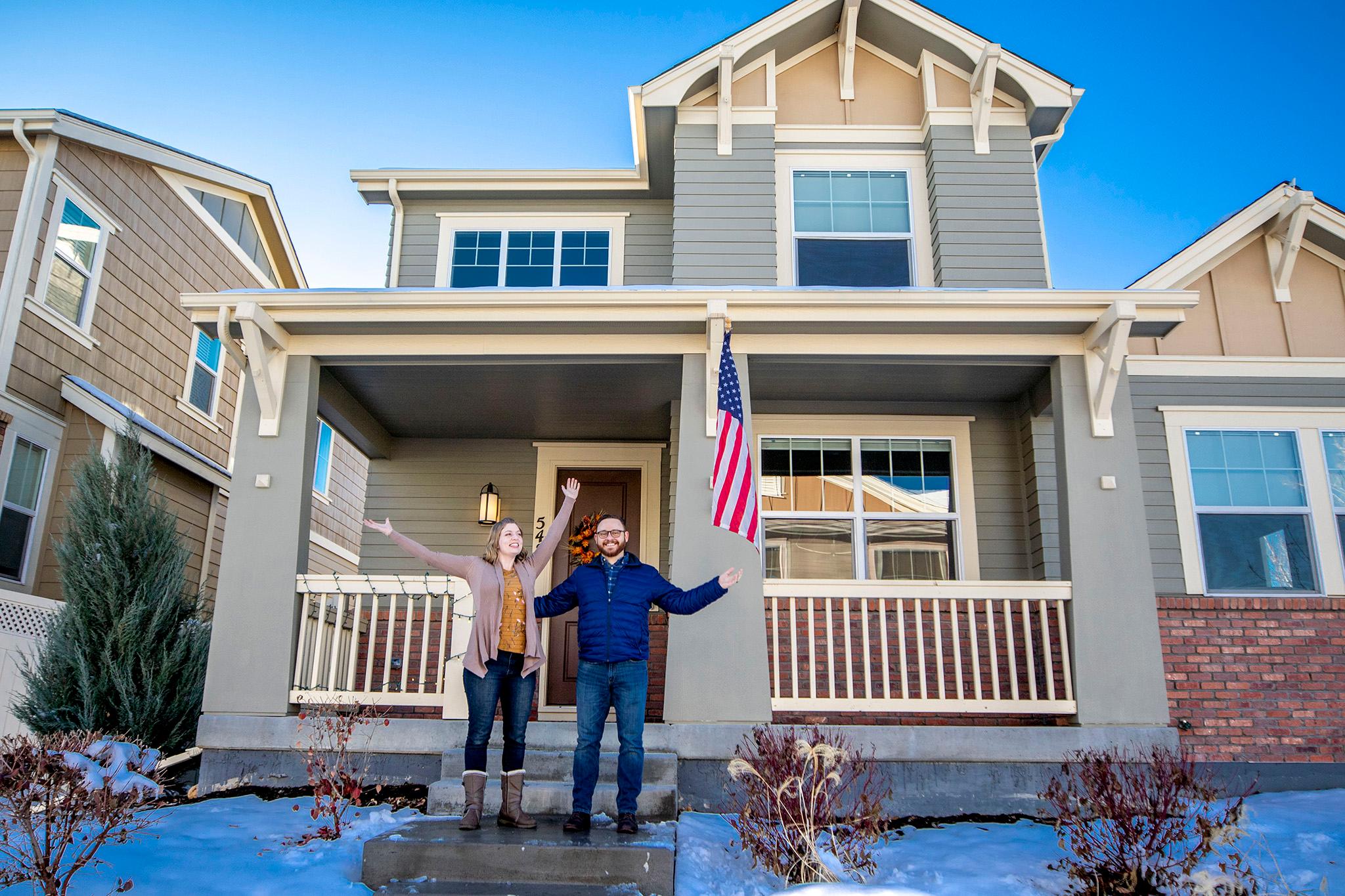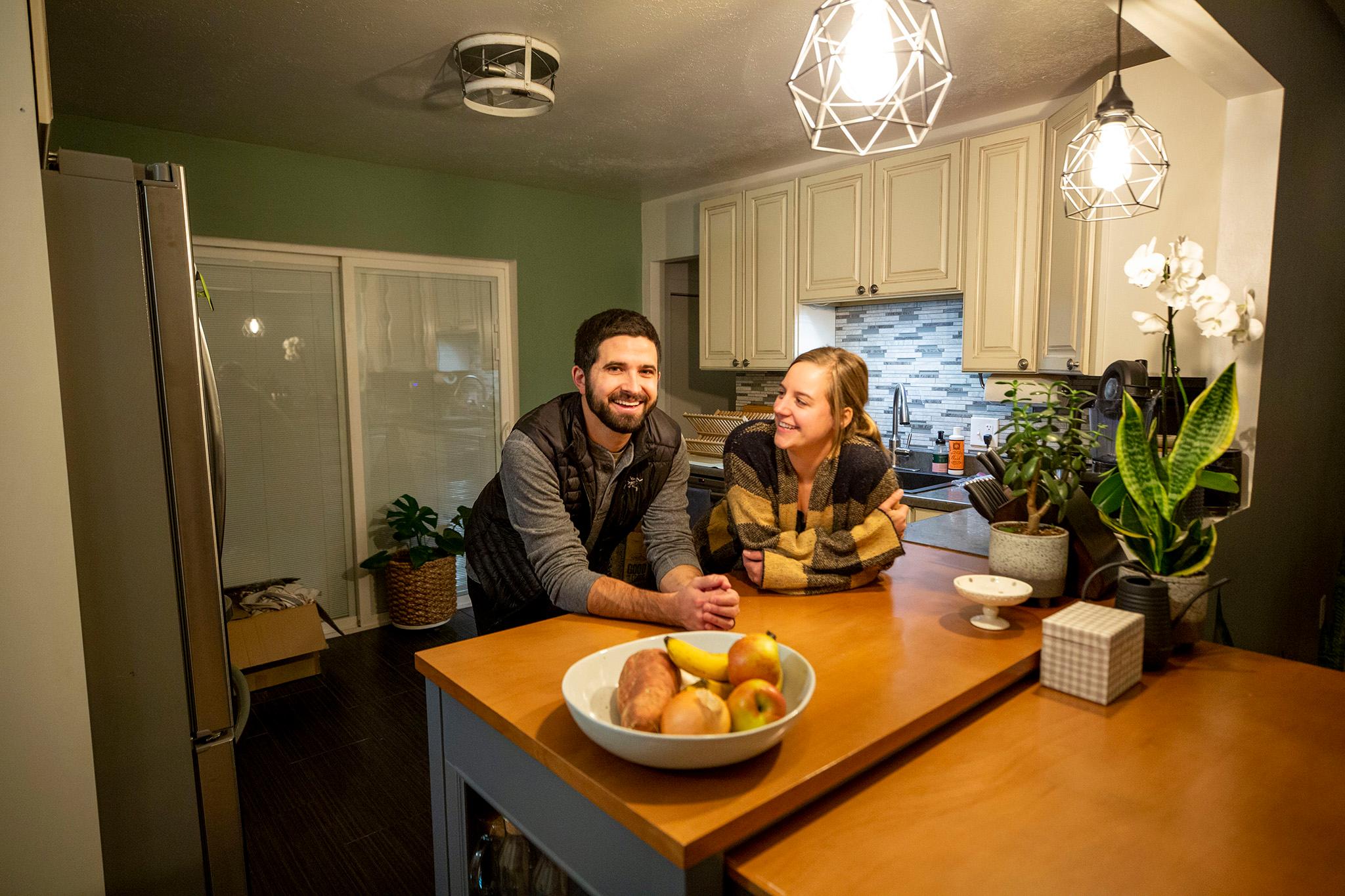After a year renting a 500-square-foot, garden-level apartment in Highland, Kimmy and JJ Strat wanted something bigger, and they wanted to buy. That was in 2018.
"We were just a little bit discouraged at what we could afford," JJ said.
The Strats stayed put and saved. But when they were ready to look again this summer, it wasn't exactly the best timing.
Andrew Abrams, who chairs the Denver Metro Association of Realtors Market Trends Committee, said when the median price for a single-family home in the Denver area hit $510,000 in September, it was "the toughest market to buy a house in Denver metro history." Since then, home prices have kept climbing (the median for a single-family home last month was $519,900). Inventory has been at record lows, and with so many people trying to take advantage of low interest rates, competition for the Strats was high.
Kimmy and JJ decided against waiting longer. If they had managed to buy in 2018, they would have had equity now, Kimmy said. There was no reason to believe it would be easier to buy if they delayed another few years. When their lease ended in August, they went month-to-month as part of preparations to buy.
The demand that has sent prices up also has been driven by a desire for space that is comfortable to work in as well as live in because of the pandemic. JJ, an energy-efficiency consultant, is among many people who have been able to work from home since COVID-19 was first detected in the Denver area in March.
JJ grew up in Centennial. Kimmy is a transplant from Iowa drawn by an outdoor lifestyle that she has found is accessible to the patients she works with as a recreational therapist at the VA hospital.
In Iowa, Kimmy said, recent college graduates can afford to buy their first home.
"The Denver salary range with the housing market doesn't really align very well," she said.
Over the past two years, they lived frugally to pay off student loan and car debts.
"The only debt we wanted to have was the house," JJ said.
They also saved, hoping to be able to put down 10 percent of the cost of a home. They needed a little help from JJ's parents to meet their down payment goal.
They set a budget of $400,000 and, guided by Usaj Realty's Kristina Casinelli, a broker they had kept in touch with after first speaking with her in 2018, began searching.
"I felt like we were pretty aggressive," Kimmy said, describing looking at homes almost every weekend throughout the metro area.
She estimated they visited 40 houses over the summer. Houses would typically be listed on Thursdays. "They're gone sometimes by Saturday," Kimmy said.
They made offer after offer, only to be outbid. They considered one home well over their budget. They toyed with such ideas as finding roommates or earning extra money through short-term rentals when they were out of town. They began to wonder if houses were being listed at just under their $400,000 limit just to draw them into a bidding war.
Casinelli said the couple was competing against people who were able to put down cash or were willing to take such steps as waiving inspections. She had clients who, after getting a taste of the market, decided to wait until spring in hopes that more inventory would be available.
"Buyer burnout is a real thing," Casinelli said. "Writing an offer is a really emotional process for buyers. After buyers do that a few times and have that heartbreak and that letdown (of being refused), they just avoid it."
She counseled the Strats to focus on houses that had not sold the first weekend. They found one in Westminster that had been on the market almost a week. They visited on a Wednesday and offered the asking price of $417,000.
"A deal these days is list price," Casinelli said.
After looking at 40 houses and making a half dozen other offers, the Strats had a home.
JJ said Westminster had not been on their radar. He suspects the house they got, for which they were the only bidders, was in a neighborhood that had been overlooked by others in the market for a home. The move has added only five minutes to Kimmy's commute to the VA hospital.
"You don't have to find a house in Highland or Wash Park," JJ said. "Don't look in the one neighborhood you've set your heart on."
Kimmy added: "Thankfully, there are still a lot of options right outside the city of Denver that are still affordable."
They had been paying $1,000 a month to their one-bedroom in Highland. Their monthly mortgage is $1,900 on their 1,700-square-foot home. The house has two bedrooms, two other rooms that can be converted to bedrooms, and a yard for the dog they've been wanting.
Buying was "overwhelming, and it's really challenging and difficult," Kimmy said. "But it's possible."

The homeowners from whom the Strats bought had already found their next home. Realtors say one of the reasons inventories are so low is that people who might want to sell their home worry about how they will find a place to move.
"It's hard to do a sale of a property and the purchase of a property at the same time" in any period, said Greg Fischer, who is the managing broker at residential real estate company West and Main. "And it's hard in a global pandemic with low inventory."
Fischer said programs are available that, for example, offer loans to people who want to move so that they can buy their next home, making them more comfortable about putting their current home on the market.
Anna Franaszek and her husband, a veteran, discussed taking out a VA loan, an option that would have required no down payment, to buy before putting their home on the market. The monthly mortgage payments would have been "horrendous," Franaszek said.
"It would not have been good," she said. "But I just felt we had an option a lot of people don't have."
In the end, they were able to find a new home in Westminster without taking that step, and their old home in Arvada sold quickly.
Franaszek and her husband spent a bit more than they had originally planned after finding their initial budget would not have bought much more house. Franaszek said that because they were going to spend more, they ruled out older homes that might need work. Newer homes meant smaller yards, they found. Franaszek is an avid gardener and the couple has two dogs. But they agreed that other priorities were more important, among them having a basement where they could set up a home gym that had been in the garage of their old home. Both Franaszek and her husband are powerlifters.
The two have been spending more time at home since the pandemic. Franaszek has since the spring been working from home as a proposal manager for an engineering firm. Her husband, an engineer for an aerospace company, has more and more days when he works from home.
Franaszek advised buyers to "have crystal-clear priorities. Know exactly what you want and where you're willing to compromise."

She and her husband initially could tour homes only virtually because of pandemic precautions. Franaszek remembered seeing houses on websites one day only to find them taken down the next, perhaps because sellers were wary of what the disease outbreak might mean.
Fischer said provisions are being added to contracts calling for a pause in the event that measures related to the pandemic make it difficult to do business as usual. Fischer added sellers are asking questions about what to do if a buyer has to back out because of a job loss related to the pandemic.
"It's a tough, real circumstance that we have to be mindful of," Fischer said, adding that while homes are selling briskly now, he's concerned about the future if job losses continue to mount.
Jessica Dominguez and her husband, Joseph, founded their Love Thy Neighbor real estate company to help low- and moderate income families buy homes. Some of their business is for market-rate homes. They also steer buyers who meet income limits to programs that, using subsidies and other measures, offer homes for under $250,000.
The Dominguezes have seen buyers scrambling for homes in the $600,000s. But demand for lower priced homes has declined. Joseph said many of the people who would qualify for affordable housing programs may be among those who have lost jobs because of the pandemic's impact on the economy, or who fear they will soon lose work.
Joseph said homeownership can provide stability in uncertain times. He speaks from experiencing, saying that before starting Love Thy Neighbor he was stuck in a rental agreement that required him to give two months' notice if he planned to leave. But it did not require the landlord to tell him in advance how much rent might increase. He had to break his lease when he learned he faced a 42 percent increase, and the landlord sued him for two months' rent.
"Renting is not designed to help people. At all," he said. "We're trying to help people who've given up hope of homeownership."
Some people may be feeling particularly hopeless as they see home prices go higher and higher. But those who have been able to save, or who might qualify for down payment assistance, could end up with a mortgage that is similar to what they are now paying in rent, without the risk of a landlord suddenly raising the price.
Muriel Williams-Thompson said homes in the $450,000 range, a price point many of her clients who are now renting can afford, are in high demand.
"It's extremely competitive," said Williams-Thompson, whose realty company, Town and Country, was founded in Denver in the 1950s by her grandfather, a pioneering Black realtor and mortgage lender.
Williams-Thompson said families seeking moderately priced homes are competing not just against other families, but investors planning on making renovations that will make the homes less affordable.
"The investors are extremely aggressive," she said.
She counsels clients that they may have to settle for a smaller home in a less desirable neighborhood. But the key is to get into the market now, in part because interest rates are low, and build equity for later.
"Maybe this is not your dream home," Williams-Thompson said she tells clients. "But maybe we can use it as a tool to get there."











